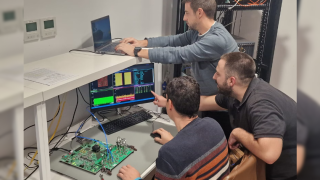“We have now successfully completed this large scale and complex reorganisation. Today we are the largest integrated telecommunications company in Russia.”
It is Rostelecom’s recently completed merger with seven regional operators, all owned by the Svyazinvest group, that made CEO Alexander Provotorov claim it is now the largest operator in the largest telecoms market in Europe. When considering the aggressive competition Rostelecom faces in the country’s mobile market, with VimpelCom, MegaFon and Mobile TeleSystems (MTS) all competing for share, Rostelecom’s latest merger gives the company greater scale to exploit the potential in the country’s ever growing mobile sector.
Consolidating the competition
Perhaps more important, in the wider context of Russia’s telecoms development, was Rostelecom’s decision to partner with three mobile competitors, supporting the wireless broadband company Yota in its bid to become Russia’s national 4G provider. Announced in March 2011, the deal would see Yota roll out its high-speed network based on LTE technology to 180 cities, using the four operators’ combined subscriber bases to bring coverage to over 70 million people. With Rostelecom assuming a near dominant position in the fixed-line market, the country’s three big MNOs – MegaFone, MTS and VimpelCom – will have access to spectrum and acquire traffic from Yota to lease out its LTE facilities, as a result of this agreement.
“Rostelecom was interested for a number of reasons,” says Henry Lancaster, senior analyst at BuddeComm. “It has permits to build an LTE network covering a third of the population, as it was awarded 30MHz spectrum in 38 of the country’s 40 regions. But the terms of this licence required it to complete the build in 18 months – which was ambitious.”
Rostelecom is still not commenting on the partnership with its three competitors and Yota, and the deal could be affected if regulators declare Rostelecom must also build its own LTE network by the end of this year. Russian regulators are very active in the telecoms space, and have also declared that only Russian vendors should be awarded contracts to build infrastructure in the region. Also, the lack of spectrum use and availability, due to regulatory restrictions, has until now damaged LTE development in the region.
State role
Despite a certain amount of caution around the Yota deal on Rostelecom’s part, the partnership is widely expected to go through. Yota’s 25% state ownership may have in some sense fast tracked the company’s development; there have been claims it has been given spectrum allocation much more easily than telcos in the region, making it a possibility that this network sharing deal has been forced upon operators, rather than optional. “In other markets, even with state ownership, regulators are always trying to make impartial and independent decisions when it comes to spectrum allocation. It is not quite clear if this is the same case in Russia,” says Angel Dobardziev, analyst at Ovum. “There is lots of evidence that Yota has been given preferential treatment with spectrum award. However, for the telcos, this deal is better than not having an LTE network at all.
Wider network sharing is slowly gaining traction and is a sign of deeper collaboration in networks among Russian operators, believes Dobardziev, even if there is an air of controversy surrounding this deal. “This announcement also suggests that Russian mobile operator choice is limited,” he says. “Unlike in the US, this deal suggests that individual telcos may be neither willing nor able to roll out their own LTE networks in the short term.”
As LTE continues to develop, different markets are taking different approaches to its implementation. In the US, major operators are not only adopting a nationwide roll out, but also using aggressive marketing campaigns to champion their own networks and discredit their competitors. With Russian operators adopting a network-sharing strategy, there are levels of uncertainty as to whether this will develop the technology more quickly. “In Russia, the scale and investment required to go it alone make the proposition very difficult,” comments Lancaster. “By not joining Yota when other MNOs do, there is a risk of being left out in the cold with enormous financial commitments in what is still a nascent field.”
In perhaps another move, Rostelecom’s strategic merger with seven regional players in the market also has state implications. At the end of 2009, the government agreed to the reorganisation of the Svyazinvest group, the largest group of communication companies in the country. The group is 25% owned by Rostelecom following the company’s stake acquisition from Comstar UTS and 75% state-owned, meaning the government will continue to have a big direct involvement in Rostelecom. The Svyazinvest group, within its separate operations, owns a 50% stake in Rostelecom, indicating the convoluted nature of Russian telecom ownership. The company and the government have confirmed that Rostelecom is still to be state run, following this merger.
Regional mergers
Regional players Sibirtelecom, Southern Telecommunications, Northwest Telecom, VolgaTelecom, Uralsvyazinform, Center Telecom, Dalsvyaz and Dagsvyazinform have now been folded under the Rostelecom umbrella. “The reasons to merge are obvious,” according to Provotorov. “By creating a competitive integrated operator by the elimination of intercompany politics of interest and territorial limitations, we can create increased competitiveness of the combined company.”
Whatever implications this deal has in terms of government ownership, it is clear that Rostelecom has been struggling in its traditional domestic voice and long-distance business and needed to address growth potential with new initiatives. Considering the company posted a 13.5% year-on-year loss in its traditional business operations and a net loss of 1.1 billion roubles for Q4 2010, compared to a 200 million rouble net profit in Q4 2009, this need became more prominent at the start of 2011.
As part of further consolidation in the Russian market, Rostelecom has entered into negotiations with MegaFon to launch as an MVNO on the MegaFon network. It is clearly the right strategy to approach as it needs to “develop its future data infrastructure,” says Lancaster. “The fixed-line telephony side of Rostelecom’s business continues to be in free fall, and future revenue growth can only be from developing value-added services and data traffic.” The merger is sure to do this, considering one of its new partners; VolgaTelecom alone has approximately 3.75 million mobile subscribers.
“Operating under a single brand, the overall goal for new Rostelecom is clear – to grow the business and boost profitability levels,” says Provotorov. “This merger increases flexibility and improves the ability to restructure mobile assets and assets located in Moscow.”
The traditional business
The growth potential in Russian telecoms is clear, particularly in the larger regions of Moscow and St Petersburg, considering the region’s size and population. Pyramid Research estimates the market generated $37.8 billion in service revenue in 2010, and predicts this will grow to $47.2 billion by 2015 as the country begins a significant substitution from fixed services to mobile. Rostelecom is also adopting this substitution in its forward strategy, considering existing operations focus mainly on fixed line and international long-distance services, with a near 80% market share in domestic fixed-line services. The company also owns and operates a nationwide fibre backbone network, spanning 160,000km, connecting to both domestic and international operators. “International traffic is one of its main growth areas and Rostelecom saw traffic between itself and international operators increase from 1.87 billion minutes in 2005 to 3.46 billion minutes in 2009,” said Lancaster. “IP traffic, on the back of more capable infrastructure, will grow at a similar scale for the next few years.”
The potential
Rostelecom has indeed become the biggest integrated telecoms operator in the country, but its focus on fixed line and its existing infrastructure leaves it still significantly behind its competitors for the more prominent mobile sector. The pending LTE network sharing deal with Yota and its regional mergers have shown the company’s intentions, with Russian telecoms on the verge of becoming the most important market in Europe. “We are operating in markets with tremendous growth potential. The opportunity is clear and we are determined to fully exploit it,” concludes Provotorov.
key facts
History: Rostelecom has traditionally been the leading provider in fixed-line domestic services and international long-distance services. It has now established itself as the largest integrated telecoms company in Russia.
Ownership: Svyazinvest is Rostelecom’s majority shareholder, owning 50.7% of ordinary shares. The Russian Deposit Insurance Agency owns 30% and Vnesheconombank owns 9.8% of the Company’s ordinary stock.
CEO: Alexander Provotorov.
International connectivity: It has direct international connections with over 150 operators in 70 countries and is participating in 25 international cable systems, co-operating with over 600 fixed-line and mobile operators internationally and domestically.
Membership: International telecommunications union (ITU); the telecommunication operator’s board of regional commonwealth (RCC); the Pacific Telecommunications Council (PTC); and the International Cable Protection Committee (ICPC).




